|
|
|
Sort Order |
|
|
|
Items / Page
|
|
|
|
|
|
|
| Srl | Item |
| 1 |
ID:
169216
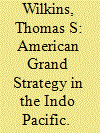

|
|
|
|
|
| Summary/Abstract |
In an era of heightened great power competition, debates about American grand strategy in the Indo-Pacific region have returned to the fore. This review essay looks at three recent volumes that directly address such debates. After introducing the concept of grand strategy, Part I reviews each of the books individually in sequence, outlining their scope, contents, and contributions. Part II then integrates the contribution of each of the volumes into a broader discussion relating to four pertinent issues: American perspectives on “Asia”; international relations (IR) theory; American strategic culture; and the rise of China, before concluding. The books under review are to differing degrees orientated toward one of the core IR theory paradigms: realism (Green), liberalism (Campbell), and constructivism/critical (Kang) approaches. As such, read together, they contribute to a multi-faceted theoretical understanding of US grand strategy in the Indo Pacific that will be of significant value to both scholars and practitioners.
|
|
|
|
|
|
|
|
|
|
|
|
|
|
|
|
| 2 |
ID:
189318
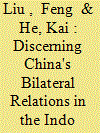

|
|
|
|
|
| Summary/Abstract |
The strategic competition between the United States and China has become a defining feature of international relations in the Indo Pacific. How China interacts with the United States and other major players in the Indo Pacific will shape the nature and process of the potential international order transition, either peacefully or confrontationally, into the future. This special feature systematically explores China's bilateral relations with five key players in the Indo Pacific, the United States, Japan, India, Australia, and ASEAN. By both theoretically unpacking bilateral relations between states and empirically examining China's strategic interactions with others in the region, this project aims to shed light on the complexity of China's bilateral relationships in the region. Each bilateral relationship is studied from both sides of the coin, i.e., by scholars from inside and outside China. This project explores the divergent perspectives between Chinese scholars and non-Chinese specialists on the same bilateral relationship in a pairwise fashion. The insights provided by this study will enrich our understanding of strategic dynamics during the period of potential order transition in the Indo Pacific against the background of U.S.-China strategic competition.
|
|
|
|
|
|
|
|
|
|
|
|
|
|
|
|
| 3 |
ID:
138125
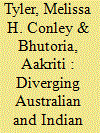

|
|
|
|
|
| Summary/Abstract |
Australia has a vital interest in preventing the Indian Ocean Region from becoming an arena of great power rivalry, including between India and China. The 2013 Defence White Paper clearly delineates the Indo-Pacific as an area of supreme importance to Australia. Developing a close strategic partnership with India is an important part of this strategy. However, there is a fundamental disconnect between Australian and Indian perceptions of the Indo-Pacific: on balance, Australia prefers to avoid being part of any formulation that could be seen as attempting to contain China and prefers an inclusive framework; by contrast, mainstream thinking in India has opposed the inclusion of China and is anxious about the growing visibility of China in the Indian Ocean Region. This means that Australia finds itself stuck in a cleft stick in managing China’s and India’s different views of the Indo-Pacific. This divergence in views leads to the potential for misunderstanding and conflict between Australian and Indian views.
|
|
|
|
|
|
|
|
|
|
|
|
|
|
|
|
| 4 |
ID:
151131
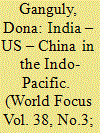

|
|
|
|
|
| Summary/Abstract |
The region of Indo-Pacific can develop into a prolific geo- economic zone if each of the three nations- India, US and China mitigate the risk of the escalating conflict and initiate a fine balance by maintaining clarity, transparency, mutual trust and unambiguous communication free of misperceptions.
|
|
|
|
|
|
|
|
|
|
|
|
|
|
|
|
| 5 |
ID:
185776


|
|
|
|
|
| Summary/Abstract |
Is Indo-Pacific the one overarching forum, evolving from a geopolitical imagination that can bring the two countries closer? If it
be so, then what are the avenues and possibilities that exist in the Indo-Pacific sphere for India and Vietnam, and what are the benefits and drawbacks of subscription to such a concept? Will it be feasible enough to sustain the aspirations as well as concerns of the two countries or there is a need for returning back to basics, and entrusting ASEAN with the centrality which is required for peace and security in the larger Asia-Pacific region. Is China a necessary evil or is it being demonised by the western media? What could be the contours of the evolving geopolitical order when alternatives such as BRICS, SCO, and Asian Infrastructure Investment Bank have been getting attention and subscription from countries across Europe, Africa, and Asia? Has regionalism lost sheen and bilateralism is the only way to deal with larger security and political issues. This paper would address these issues and look for possibilities with regard to India and Vietnam cooperating in the geo-political, and geo-strategic construct which is now known as Indo-Pacific.
|
|
|
|
|
|
|
|
|
|
|
|
|
|
|
|
| 6 |
ID:
185822


|
|
|
| 7 |
ID:
157966


|
|
|
|
|
| Publication |
Oxon, Routledge, 2017.
|
| Description |
xi, 137p.hbk
|
| Standard Number |
9781138205253
|
|
|
|
|
|
|
|
|
|
|
|
Copies: C:1/I:0,R:0,Q:0
Circulation
| Accession# | Call# | Current Location | Status | Policy | Location |
| 059335 | 320.91824/DOY 059335 | Main | On Shelf | General | |
|
|
|
|
| 8 |
ID:
190662
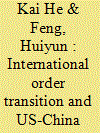

|
|
|
|
|
| Summary/Abstract |
The world is changing, and the liberal international order (LIO) is at stake. Scholars and pundits hold different views on whether and how an order transition will take place. We argue that the divergent arguments around LIO are rooted in contested conceptualizations of what an international order is as well as the untheorized measure of what counts as a ‘transition’ of international order. We propose a synthesized and deductive approach to defining international order with three pillars: power, institutions, and norms. We argue that a significant order transition will take place when at least two pillars of the order are fundamentally challenged and eventually changed. Applying this deductive, three-pillar conceptual framework of international order, we preliminarily examine how US-China competition has impacted the current LIO in the Indo Pacific. We conclude that the multi-pillar feature of the international order technically strengthens the sustainability and resilience of the current LIO. Even though China’s rise might change the power distribution in the system—the power pillar of the order, the mere power shift between China and the United States will not lead to a significant order transition if the other two pillars of the order remain intact.
|
|
|
|
|
|
|
|
|
|
|
|
|
|
|
|
| 9 |
ID:
190661
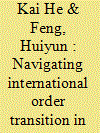

|
|
|
|
|
| Summary/Abstract |
The world is in crisis. The Covid pandemic and the ongoing Russia-Ukraine war signify a potential order transition in the international system. The Indo Pacific is at the center of gravity of great power competition between the US and China. How have policy elites in the region perceived the potential order transition against the background of US-China strategic competition? How have states, including both great and secondary powers, chosen different strategies to cope with security and economic turbulence in the Indo Pacific? This special issue intends to shed some light on these questions by critically examining the diverse perceptions and policy choices of the United States, China, South Korea, India, Japan, Indonesia, and the UK during the period of potential order transition in the Indo Pacific. It provides an academic platform for scholars to engage in this ‘order transition’ topic from different theoretical perspectives as well as from respective national angles in the Indo Pacific. It suggests that the complexity of the international order itself has made the ‘order transition’ more complicated and difficult than before. It is the best of times, it is the worst of times, and it is the most challenging time for state leaders and scholars alike.
|
|
|
|
|
|
|
|
|
|
|
|
|
|
|
|
| 10 |
ID:
185869


|
|
|
| 11 |
ID:
142085
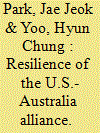

|
|
|
|
|
| Summary/Abstract |
Despite potentially significant differences between an American superpower’s and an Australian middle power’s global and regional interests and strategies, the U.S.- Australia alliance has remained resilient. Moreover, Australia has recently been very cooperative with the U.S. deployment of its military assets on Australian soil. What lies behind this intriguing set of circumstances in alliance relations? To address this question, this article begins by providing a historical overview to show that the U.S.- Australia alliance is resilient despite the lack of a mutually perceived threat. Then, this article criticizes the argument that the U.S.-Australia alliance continues because it is insurance against potential military threats, especially against potential Chinese threats. First, the likelihood of a “fundamental” attack on the Australian homeland is very slim. Moreover, the ANZUS accord lacks a formal mechanism that triggers an automatic U.S. involvement in the way that NATO’s Article Five mandates such a U.S. response in Europe. Second, currently the American and Australian threat perceptions regarding China vary. Canberra entertains less fear of a “rising China” than does Washington. Instead, this article provides order-centric rationales for retaining and strengthening the U.S.-Australia alliance, and in that context it analyzes the recent development of the alliance’s military aspects, including the deployment of U.S. Marines in Darwin on a rotational basis.
|
|
|
|
|
|
|
|
|
|
|
|
|
|
|
|
|
|
|
|
|